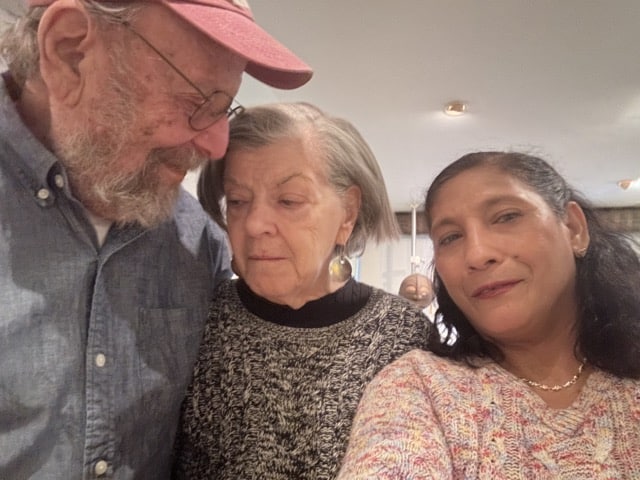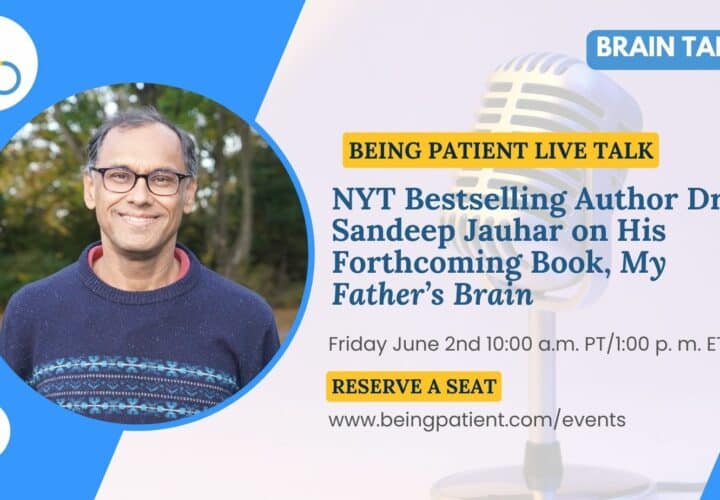New York Times bestselling author Dr. Sandeep Jauhar reflects on his unexpected personal journey caring for his father after an Alzheimer's diagnosis.
Despite years of experience in the medical field, Dr. Sandeep Jauhar found himself having to learn new tactics and practice empathetic caregiving, a process he undertook in the midst of “flailing” as a caregiver. In his latest book, My Father’s Brain, Jauhar unveils the challenges he experienced at the intersection of being a physician and a struggling son and caregiver of a father diagnosed with Alzheimer’s.
Faced with caring for his father, Jauhar’s feelings of denial and frustration were transformed into hope and curiosity about how to be a better son and doctor to his patients.
What were Jauhar’s biggest learnings along the way, that caregivers can apply?
1. Practice “validation therapy”
Many caregivers have a desire to correct their loved ones simply due to an innate desire to help them or to make them feel involved in the going-ons around them. Experts like Teepa Snow urge caregivers to refrain from correcting their loved one.
“Since preserving your relationship should be the primary focus, you will have to give up on being ‘right,’” Snow said. “Does it really matter if the individual you support is seeing something a different way?”
Jauhar admits that a guiding principle he applies as a doctor to be completely truthful with his patients only had a negative impact when caring for his father: “For me, telling my father the truth was like telling him, ‘You’re still a part of my world, that you deserve to know the truth. That’s the most dignified way I can treat you,’” Jauhar recalled in a conversation with Being Patient. “What I came to understand is that there’s a different conception of dignity.”
When Jauhar’s father frequently asked about the whereabouts of Jauhar’s mother, who passed away in 2006, the brothers would say things like, “Mom’s on a plane.” Rather than reminding Jauhar’s father of the sad reality, this answer would comfort him and he often would switch to discussing a different topic. “Validation therapy” or “therapeutic deception” as Jauhar refers to the practice was conducive to Jauhar becoming an effective caregiver.
“There’s a difference between lying to someone for your own benefit and for their benefit,” Jaunhar said. “Telling the truth when it causes tremendous anguish isn’t worth it. It actually doesn’t matter.”
“There’s a difference between lying to
someone for your own benefit and for
their benefit. Telling the truth when it
causes tremendous anguish isn’t
worth it. It actually doesn’t matter.”
2. Look for ways to reduce stress for your loved one
Many caregivers feel dismayed and even frustrated with their loved one when they just can’t seem to remember basic things – who someone is, how to do a simple task, or where they are. It’s important not to react in a way that can make your loved one stressed or embarrassed. “Part of me just very irrationally thought that if I could get my father just to try harder, try harder to remember to concentrate, he’d be able to do some of the things that he was able to do,” Jauhar said of his early days as a caregiver for his father, a former geneticist.
Monash University associate professor of psychiatry Yen Ying Lim describes that changes in behavior or emotional state for a person living with dementia can be a source of new stress for them. The changes in behavior can be a result of changes in the brain or a result of frustration stemming from challenges in communicating effectively.
Jauhar describes himself as possessing a “hyper-rational way of being,” and having to learn to shift this portion of his personality to the back seat. “I would scold him in a loving way, but that created a lot of stress for him,” Jauhar said of his father.
“One of the things I definitely would have done differently is not try to correct him so much, not try to get him to see the error in what he was doing and kind of accept him as a person who had changed, but someone who was still my dad, and someone who I still loved,” said Jauhar. “It’s hard to convey that love when you’re trying to change someone back to what they used to be.”
“It’s hard to convey that love when
you’re trying to change someone
back to what they used to be.”
3. Think ahead about end-of-life care
When reflecting on the final days of his father’s journey with dementia, which was spent in hospice care, Jauhar said, “It was fraught with a lot of ethical challenges for me.”
Navigating end of life care for his father tested Jauhar as a doctor, a son, and a caregiver but it also was a lesson in how to be a more empathetic doctor. “Like many of my colleagues, before I went through this journey when patients would get referred to hospice or palliative care, I would step back. I would say, ‘well, there’s really nothing more I can do.’”
Jauhar notes that a solid partnership between the family and the doctor, especially in hospice scenarios, can make end-of-life care less emotionally-taxing on the family. He is adamant that open communication between himself and the family he is caring for is a top priority going forward in his career.
“What I realized, being the son of someone who’s dying, is that it was really important for me that my father’s doctor still remained engaged with our family and still sent text messages and sort of checked up on things,” Jauhar said. “So, I strive to do that in my practice much more than ever.”
‘My Father’s Brain’: Dr. Sandeep Jauhar on Alzheimer’s Caregiving




